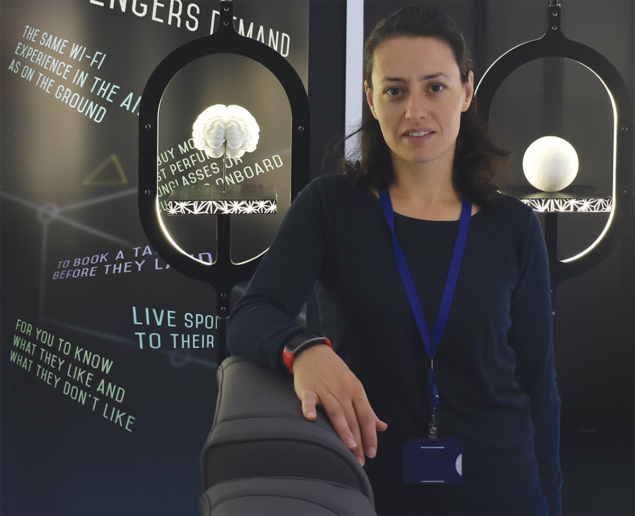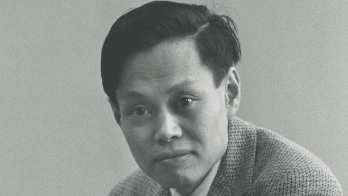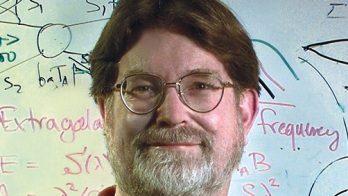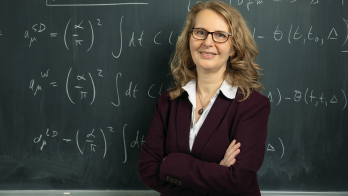Eleni Mountricha describes her transition from ATLAS physicist to data scientist in a satellite communications firm.

In 2018, Eleni Mountricha’s career in particle physics was taking off. Having completed a master’s thesis at the National Technical University of Athens (NTUA), a PhD jointly with NTUA and Université Paris-Sud, and a postdoc with Brookhaven National Laboratory, she had just secured a fellowship at CERN and was about to select a research topic. A few weeks later, she ditched physics for a career in industry. Having been based at CERN for more than a decade, and as a member of the ATLAS team working on the Higgs boson at the time of its discovery in 2012, leaving academia was one of the toughest decisions she has faced.
“On the one hand I was looking for a more permanent position, which looked quite hard to achieve in research, and on the other, in the years after the Higgs-boson discovery, my excitement and expectation about more new physics had started to fade,” she says. “There was always the hope of staying in academia, conducting research and exploring new fields of physics. But when the idea of possibly leaving kicked in, I decided that I should explore the potential of all alternatives.”
Mountricha had just completed initial discussions about her CERN research project when she received an offer of a permanent contract at Inmarsat – a provider of mobile satellite communications based in the nearby Swiss town of Nyon. It was unexpected, given how few positions she had applied for. “I felt a mixture of happiness and satisfaction at having succeeded in something that I didn’t expect I had many chances for, and frustration at the prospect of leaving something that I had spent many years on with a lot of dedication,” she explains. “What made it even harder was the discussions with other CERN experiments during the first month of the fellowship, which sparked my physics excitement again.”
New pastures
Mountricha’s idea to leave physics first formed after attending, out of curiosity, a career networking event for LHC-experiment physicists in November 2017. “The main benefit I got out of the event was a feeling that, even if I left, this would not be the end of the world; and that, if I searched enough, I could always find exciting things to do.” The networking event now takes place annually.
The Inmarsat job was brought to Mountricha’s attention by a fellow CERN alumnus and it was the only job that she had applied for outside physics. “I believe that I was lucky but I also had invested a lot of personal time to polish my skills, prepare for the interview and, in the end, it all came together,” she says.
People should not feel disappointed for having to move outside physics
Today, Mountricha’s official job title is “aero-service performance manager”. She works in the data-science team of the company’s aviation department collecting and reporting on data about aircraft connectivity and usage. This involves the use of Python to develop custom applications, analysing data using Python and SQL, and developing reporting and monitoring tools such as web applications. Her daily tasks vary from data analysis to developing new products. “Much of the work that I do, I had no clue about in the past and I had to learn. Some other pieces of work, like the data analytics, I used to do in a research context. However, the level at which I was doing it at CERN was much more sophisticated and complex. Many people in my team are physicists, all of them from CERN. Besides the technical aspects though, it is really at CERN that I learned how to collaborate, discuss with people, bring and collect ideas, solve problems, present arguments, and all those soft skills that are very important in my current job.”
As for advice to others who are considering taking the leap, Mountricha thinks that people should not feel disappointed for having to move outside physics. “Fundamental research is a lot of fun and does equip us with much sought-after skills and experience. On the other hand, there are many exciting projects out there, where we can apply everything that we have learned and develop much further.”
Higgs nostalgia
While happy to be on a new career path at the age of 37, working on the search for the Higgs boson will take some beating. “The announcement of the discovery was made in July, the papers were published in August and I defended my PhD thesis in September, so there was much pressure to finalise my work for all of those deadlines,” recalls Mountricha. “Even the times when I was sleeping on top of my PC, exhausted, I still remember them with love and nostalgia. In particular, I remember the day of the announcement of the discovery, there were people sleeping outside the main auditorium the night before in order to make it to the presentation. As a result, I ended up watching it remotely from building 40 together with the whole analysis team. I was slightly disappointed not to be physically present in the packed auditorium, but this nevertheless remains such an important moment of my life.”








